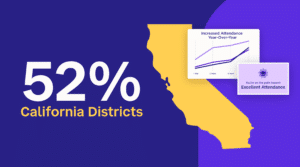
Featured Resource
Why Over Half of California School Districts Trust SchoolStatus
Read More >Join Mission: Attendance to reduce chronic absenteeism in 2025-26! >> Learn How <<






How is the work of an evaluator and a coach different? Confidentiality! Ellen Eisenberg, executive director of The Professional Institute for Instructional Coaching (TPIIC), explains the value of privacy and trust in a coaching partnerships.
“T
o share or not to share,” that is the question. We know that confidentiality is a virtue of loyalty, but what does it mean in the instructional coaching world? How do we support our teaching colleagues while ensuring confidentiality and fidelity to our coaching interactions?
Let’s first address the issue of safety and legality. If there are issues with either, the coach and teaching colleague are responsible for reporting them to the administration immediately—that’s an expectation and requirement, not a suggestion. But what about issues with instructional delivery and what could be construed as educational apathy or neglect? How do coaches handle these issues competently and still support their colleagues in a non-evaluative way?
Clarity is an essential element to any coaching conversation. The administration, leadership team, school staff, and the coach must share and communicate their vision, goals, and expectations for school-wide improvement. Additionally, they must have a shared understanding of the effective components of instructional coaching and how coaches can help make changes in classrooms, instructional practice, and schools.
Open dialogue, collective problem-solving, and continuous support are fundamental for instructional coaching to be effective. Conversations about school data and strategies to achieve goals are most productive when shared in a group setting, with the administrator and coach side-by-side so that all parties are on the same page. Additionally, these conversations should occur three times a year (i.e., beginning-, middle-, and end-of-year) as a way to set goals and to reflect on practice.
Instructional coaching is not a deficit model; although many think of it as a “fix it” model to repair what’s wrong in a classroom, nothing could be further from the truth! Coaching is about helping instructional colleagues become architects of their own learning and to promote reflective practice so they can ask themselves the kinds of questions that lead to instructional transformation. The key to this is a safe environment where coaching conversations are in the privacy of a teacher’s space—both emotionally and physically.
Teachers feel safe when they can share information about the coaching support they received, but without the coach sharing the actual conversation. This is about dependability, trust, and understanding, and not about accountability or responsibility. Yes, the coach is responsible for creating a safe environment where teachers can talk about practice without fear of an evaluation. At the same time, coaches are also responsible for ensuring that their colleagues understand that fidelity to the relationship and the instructional coaching paradigm is what helps move practice forward and creates positive change.
Coaches are accountable for providing ample opportunities for collaborative practice so that teachers can learn from each other in a risk-free, confidential environment. At the same time, the coach is responsible for ensuring that teachers implement effective instructional habits through theory, demonstration, and practice. All of this is achieved when the teacher feels comfortable and regularly reflects with the coach in a safe environment built on trust.
Neither instructional coaches nor their teaching colleagues want to be insubordinate. In fact, they should always support the administrative team and make the topics offered in professional learning sessions public. But, there’s a limit to what coaches are responsible for doing and one of those things is to not be evaluative or sharing confidential conversations with the administrative team.
Through positive intentions and the assistance of the administrative team, coaches build awareness of the professional learning that’s designed to help achieve the goals for school-wide improvement. One way coaches can implement this is to encourage the administrative team to walk around and see what is happening in each classroom firsthand—not through someone else’s filter.
Coaching should be ubiquitous in a school by enabling conditions that promote confidentiality, fidelity to a coaching model, and loyalty to the relationships among teachers and their coaches—built on mutual trust and discretion! In addition, coaches need to diplomatically remind their administrators the importance of being visible in the process for school-wide change.
Ellen B. Eisenberg is the executive director of The Professional Institute for Instructional Coaching (TPIIC), and the former executive director of The Pennsylvania Institute for Instructional Coaching (PIIC) from 2009-2018. Established in 2018, TPIIC is a researched-based resource for developing and supporting the delivery of consistent, high-quality professional development and professional learning around instructional coaching and mentoring designed to help teachers implement effective instructional practices.
{{cta(‘352a410e-db79-4f33-a482-d301e8041965′,’justifycenter’)}}
 SchoolStatusSchoolStatus gives educators the clarity and tools they need to get students to class and keep them moving ahead. Through our integrated suite of data-driven products, we help districts spot attendance patterns early, reach families in ways that work for them, and support teacher growth with meaningful feedback. Our solutions include automated attendance interventions, multi-channel family communications in 130+ languages, educator development and coaching, streamlined digital workflows, and engaging school websites. Serving over 22 million students across thousands of districts in all 50 states, SchoolStatus helps teachers and staff see what matters, act with speed, and stay focused on students.
SchoolStatusSchoolStatus gives educators the clarity and tools they need to get students to class and keep them moving ahead. Through our integrated suite of data-driven products, we help districts spot attendance patterns early, reach families in ways that work for them, and support teacher growth with meaningful feedback. Our solutions include automated attendance interventions, multi-channel family communications in 130+ languages, educator development and coaching, streamlined digital workflows, and engaging school websites. Serving over 22 million students across thousands of districts in all 50 states, SchoolStatus helps teachers and staff see what matters, act with speed, and stay focused on students.
News, articles, and tips for meeting your district’s goals—delivered to your inbox.






